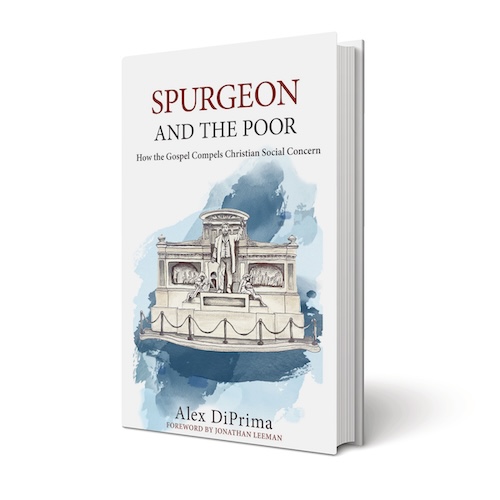Charles Spurgeon was a young, zealous 15-year-old boy when he came to faith in Christ. A letter to his mother at the time captures the enthusiasm of his newfound Christian faith: “Oh, how I wish that I could do something for Christ.” God granted that wish, as Spurgeon would become “the prince of preachers,” the most influential clergyman in 19th-century London. Many books have and will be written about all that Charles Spurgeon did for Christ through his decades of preaching at the Metropolitan Tabernacle. Alex DiPrima has given us both an excellent historical survey of a lesser-known aspect of Spurgeon’s ministry—his care for Britain’s poor and needy—and a call to action for today’s congregations to follow his example.
Baptist minister C.H. Spurgeon was not merely the “prince of preachers,” sometimes addressing crowds of 10,000 or more—he also had a heart for the poor and oppressed. But his work in the city was no social gospel. It was the fruit of the saving gospel.

By Alex DiPrima
(Reformation Heritage Books, 2023)
Having written his doctoral dissertation on Spurgeon’s “evangelical activism,” DiPrima, a Southern Baptist pastor in North Carolina, is an ideal author for Spurgeon and the Poor: How the Gospel Compels Christian Social Concern. This book deftly combines the academic and the pastoral. It introduces readers to Spurgeon’s numerous ministries and draws out ways in which pastors and church members can notice and serve their community’s needs.
DiPrima structures the book in two parts, demonstrating (1) the theological foundations of Spurgeon’s charity and (2) his institutions and methods for going about this task. Part 1 is the heart of Spurgeon and the Poor’s thesis and a resounding theme throughout the book. Spurgeon did not hold competing commitments: evangelical Baptist theology on the one hand and the importance of charity to the disadvantaged on the other. Instead, he believed that the latter is directly derivative of the former.
Spurgeon believed that compassion for the poor and needy is the fruit of true Christian conversion. Evangelicals then and now hold fast to the Bible’s teaching that God saves his people through a “new birth.” The Holy Spirit works in the heart of a sinner to convict him of his own sin and need for a savior and give him new desires to worship and serve God. Consequently, while Spurgeon did not believe that goods works merit salvation, he affirmed them as evidence of it.
Born-again Christians will understand the great mercy God has shown them and share that mercy with others. Consequently, Spurgeon’s sermons and other writings assert that it is the task of all Christians to do works of compassion for the needy in their own community. He said on one occasion, “Sympathy is especially a Christian duty. Consider what the Christian is, and you will say that if every other man were selfish he should be disinterested; if there were nowhere else a heart that had sympathy for the needy there should be one found in every Christian breast.” This is not to imply that every Christian must become a career philanthropist, but it does mean that all Christians must do what they can.
Spurgeon believed that compassion for the poor and needy is the fruit of true Christian conversion.
When Christians care for the poor, they also imitate the example of their Savior. The incarnate Logos understood human needs and sought to meet them while also pointing them to their greater spiritual need for salvation. The immediate context of Spurgeon’s congregation at the Metropolitan Tabernacle was London, the state of which was described by Spurgeon as “abject misery.” Spurgeon did not allow his listeners to avert their eyes from the poor around them. As he said on another occasion, “I want you to help this heathen world, but I want you to begin with caring for this heathen world of London.”
Sensitive to accusations that Spurgeon’s emphasis on works of charity links him to the social gospel, DiPrima takes pains to demonstrate that his theology was instead consistent with evangelical convictions. If the social gospel holds that “the church’s primary aim is to improve society as a whole, especially the material conditions of the poor, rather than saving souls,” it is a far cry from Spurgeon’s philosophy of ministry. Charity commends and illustrates the gospel but is not identical with it. Spurgeon consistently kept evangelism as a central goal of his social ministry because of his convictions about the main mission of the church—“the preaching of the truth unto the salvation of sinners and the edification of the saints,” as DiPrima describes it. All of the philanthropic outreaches of the Metropolitan Tabernacle operated with the assumption that care for physical needs is an important but secondary concern to caring for spiritual needs. The one could, in fact should, lead to the other.
Part 2 of Spurgeon and the Poor describes Spurgeon’s many charitable ministries and societies. According to one list, Spurgeon was instrumental in the founding and management of 66 such organizations. The Seventh Earl of Shaftesbury, a friend of Spurgeon’s and one of the leading English social reformers (and an evangelical Anglican), once commented on this list: “What a tale of [Spurgeon’s] agencies … How it showed what a powerful administrative mind our friend has. That list of associations, instituted by his genius, and superintended by his care, were more than enough to occupy the minds and hearts of fifty ordinary men.”
Spurgeon’s ideal of a ‘working church’ is very consistent with the Baptist distinctive of church covenants.
Spurgeon’s efforts to start missions, schools, and other societies were shared by many evangelical Victorians. Numerous such organizations were founded in England at this time, often initiated by members of the upper class, to combat widespread poverty. Gertrude Himmelfarb wrote on the Victorian “social ethos” of benevolence and charity in The Roads to Modernity. It originated in both the virtue formation of the British Enlightenment and the charitable commitments of evangelicals like Shaftesbury and Spurgeon.
Spurgeon’s distinction among this group is a conviction that DiPrima highlights throughout Spurgeon and the Poor: his organization of these societies within his local church. Even more impressive than the number of his organizations (66) is the fact that they were all sponsored by the Metropolitan Tabernacle, with oversight by Spurgeon himself. Spurgeon aspired to lead a “working church.” Its facilities were used every day of the week, and he called every member to participate in them or some other gospel work.
Spurgeon’s ideal of a “working church” is very consistent with the Baptist distinctive of church covenants. Works and institutions of mercy like those founded by Spurgeon well exhibit the Metropolitan Tabernacle’s collective promise to “walk in all holiness, godliness, humility, and brotherly love, as much as in us lieth to render our communion delightful to God, comfortable to ourselves, and lovely to the rest of the Lord’s people.” The task of Christ-reflecting charity is one for all church members, not just clergy or the upper classes.
Because these ministries were based in the local church, the church’s mission became their mission as well. Spurgeon’s support of the Stockwell Orphanage, ragged schools (free schools for poor children), religious publication societies, and almshouses reflect widely held evangelical practices in his day. Yet their aim under Spurgeon’s leadership was particularly oriented toward the final end of evangelism and Christian discipleship. DiPrima makes this admonition to his readers based on Spurgeon’s life: social ministries are best situated within the context of a local church. Charity and philanthropy exist not merely for their own sake but also to point the impoverished to their need for a Savior, a good beyond this world. DiPrima’s affirmation of this argument throughout his book is almost repetitious, but it is well demonstrated from Spurgeon’s ministry and wise advice for churches committed to caring for their communities in our own day.

DiPrima’s two chapters on Spurgeon’s relationship with British politics prove to be the most nuanced chapters of Spurgeon and the Poor. Although a friend of Shaftesbury, a Tory, Spurgeon was an unapologetic Liberal who regularly supported Liberal Party candidates and policies, including disestablishment, anti-imperialism, anti-slavery, and nonsectarian public education. His statements on the matter draw a fine line. Spurgeon argued in 1873 that “for a Christian minister to be an active partisan of Whigs or Tories, busy in canvassing, and eloquent at public meetings for rival factions, would be of ill repute.” In 1880 he published a pamphlet arguing that the Tories’ commitment to imperialism and bloodshed meant that they must be defeated in the upcoming election. In fact, DiPrima recounts that he was described in a newspaper as “the greatest single influence in South London in favour of Liberalism.”
DiPrima considers the argument that Spurgeon was a “political preacher” but soundly rejects it, leaning on his overall thesis as evidence for the preacher’s careful restraint regarding political activism. Spurgeon only engaged political arguments where he saw clear religious implications, and he typically reserved political comments for articles, not sermons. The practical wisdom of DiPrima’s book shines here. Without giving a full endorsement to Spurgeon’s sometimes partisan comments, he concludes that pastors can learn from Spurgeon to keep the pulpit sacred for biblical preaching and to limit political statements to textual implications. The work of the church is the salvation of souls and the recovery of spiritual health; cultural and political renewal flow out of and point toward it.
An aspect of Spurgeon’s political arguments that will especially interest readers of Religion & Liberty is his opposition to centralized reforms and socialism. While he supported the party of reform, Spurgeon was under no illusions that government action could solve Britain’s struggles with poverty. Christian socialism was rising as Spurgeon rose, and he soundly condemned it. He gave both the problem and the solution in 1891: “Great schemes of socialism have been tried and found wanting; let us look to regeneration by the Son of God, and we shall not look in vain.” To the question of how to cultivate a free and virtuous society, Spurgeon would answer: trust in Christ, recognize the needs of others, and as a local congregation form institutions to help them. Let your care for the physical needs point them to their greater spiritual needs.

Today almost every American town of any significant size seems to have a church that dubs itself “a church for the city.” DiPrima applies this label to Spurgeon’s Tabernacle but with a different definition than is typical. Victorian London was in many ways a dark place; along with many other Christians, Spurgeon and his congregants cared for the sick, impoverished, widows, and orphans. Metropolitan Tabernacle was not a church for the city because it saw it as a gleaming shimmer of hope; rather, it saw the city as a place that needed spiritual and physical renewal. Christians can only meet those needs because of the work of Christ. As Jonathan Leeman says in the foreword, transformation is not something that humans accomplish; it’s the purview of the Holy Spirit.
To Christians considering a solution to poverty in the 21st century, Spurgeon and the Poor is an orienting and strengthening reminder of the motivation and power behind that goal and the best institutional practices by which it can be achieved. Christians engage in social ministry because of the mercy shown to them by Christ “who gave himself for us to redeem us from all lawlessness and to purify for himself a people for his own possession who are zealous for good works” (Titus 2:14). It is because of that gospel and through the local churches into which Christ has called us that those suffering from poverty can find both material and spiritual healing.



